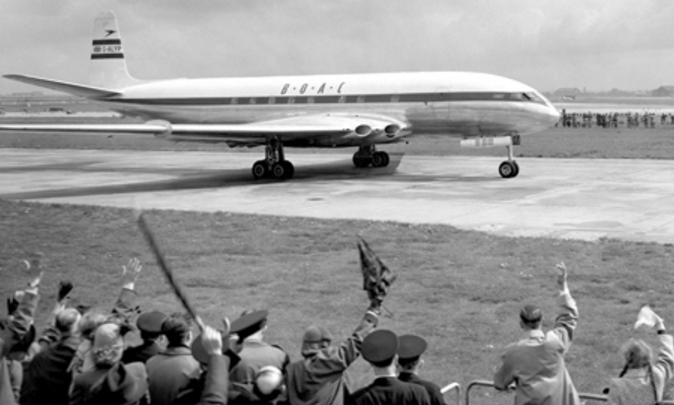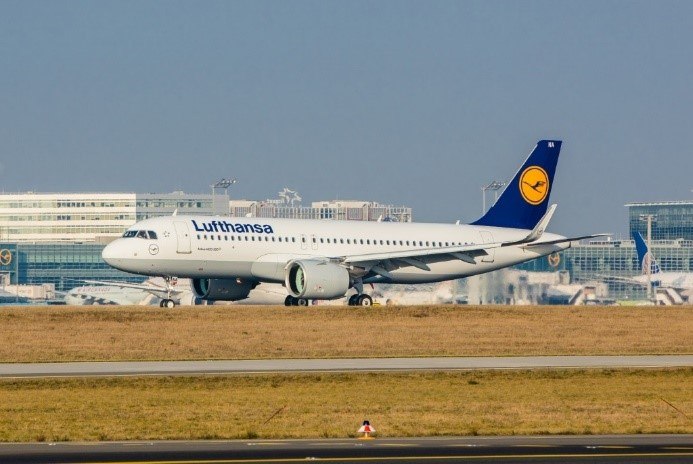Airbus: more value, less impact

Air traffic is forecasted to grow annually by 4,5% for the next 20 years. Fuel efficiency is supposed to improve 1,5% annually until 2020. How is Airbus reacting to foster growth and avoid the pressure of climate change?
In 2015, flights produced 781 million tons of CO2 , representing around 2% of all human induced carbon dioxide emissions and 12% of CO2 emissions from all transport sources and these figures are expected to grow. In fact, air traffic has almost doubled since 2001 and is forecasted to grow annually by 4,5% for the next 20 years. To assess this growth from a climate change standpoint, key air transport players have committed to improve fleet fuel efficiency by 1,5% per year through to 2020.
In that same year (2015), Airbus received 1080 airplane orders while Boeing received 768, what consolidates the European Aircraft manufacturer as a leading player moving forward. However, Airbus will only be able to preserve the world lead in commercial aircraft orders if it continues to beat fuel efficiency figures whilst delivering airplanes on time, quality and cost1-9.
How is Airbus reacting to foster sustained growth while avoiding the pressure imposed by climate change?
Environmental awareness and eco-efficiency at Airbus
In 2007 Airbus defined its 2020 Vision with focus on decreasing the impact of its production activities and services on the environment. In 2009 Airbus adhered and supported the 3 environmental targets defined by the ATAG (Air Transport Action Group) and agreed by IATA (International Air Transport Association):
– 1,5% annual fuel efficiency increase from 2010 through 2020
– Carbon neutral growth from 2020 through 2050
– Reduction of 50% in the CO2 generated by aviation activities as compared to 2005
Airbus is focusing on environmental innovation to match these ambitious objectives and be recognized as the leader in eco-efficient solutions for sustainable aviation. These efforts are bundled in the eco-efficiency initiative, deeply embedded within Airbus operations from decisions taken by top management to day-to-day operation in the final assembly lines. The eco-efficiency initiative is divided in 6 pillars10 11.
- Eco-engagement
Airbus has implemented an environmental policy to define and direct the way in which the company embeds eco-efficiency within product development, industrial operations and services. This effort has enabled Airbus to become the first company in the aerospace manufacturing sector to receive ISO 14001, an internationally recognized standard for effective environmental management from its products to its services through a life-cycle approach12.
- Eco-initiatives
Airbus leverages the latest eco-friendly technologies, processes and buildings to gain efficiencies in 5 main areas: save energy, reduce water consumption, cut down waste, reduce CO2 and lower VOC (volatile organic compounds)13.
- Eco-innovation
Innovation has always been at the hearth of aircraft manufacturers and Airbus is no exception, investing ~2 billion euros every year into research and development, most of which provide environmental improvements. In this sense, Airbus is advancing in eco-technologies such as fuel cells to power aircraft cabins and systems in a cleaner and more efficient way than jet engines14.
- Eco-performance
Airbus strives to develop new aircraft that continuously beat previous models. Last developments include A320neo that offers a ~15% fuel burn saving operation compared to similar aircraft and A350XWB (featuring a 53% composite structure) that offers ~25% saves in fuel consumption compared to its long range competitors. Furthermore, Airbus is working on upgrading its other models (A380, A330) to increase efficiencies across its whole fleet15.
- Eco-partnerships
Airbus partners with world leading industry stakeholders (airlines, government agencies, ATM (air traffic management) organizations and engine manufacturers) to improve operations end-to-end. These partnerships have led to the completion of a perfect flight, with 40% CO2 reduction compounding Airbus fuel efficient jetliners, sustainable aviation fuels, streamlined ATM procedures and optimized operations16.
- Eco-services
Airbus also focuses on increasing the efficiency services provided to in-service aircraft and retired aircraft. For instance, Airbus developed the first full scale demonstration project to identify a generic methodology to handle end-of-life aircraft in a sustainable manner, closing the integrated lifestyle approach to aircraft design, manufacture and operation17.
Market disruption moving forward
However, Airbus eco-efficiency initiative will only be really successful with a disruptive discovery. Jet aircraft in service today are 80% more fuel efficient than the first jets in the 1960s yet the design and operation has almost remained unaltered. Therefore, there is not much room for incremental improvement in today’s approach.
Comet first commercial flight in 195218 Airbus A320neo first flight in 201619
Moving forward, Airbus will have to develop new designs and operational models in an effort to match increasing air travel demand while complying with stricter environmental regulation. Some experts point towards integrated engines designs while others opt for suborbital flights as the solution for long-haul air travel. In addition, greener fuels are a must to decouple air travel from fossil fuels before new energy sources are invented.
Conceptual aircraft design with integrated engines to reduce noise and increase efficiency20
780 words
Resources:
- Wikipedia. 2016. Environmental impact of aviation – Wikipedia. [ONLINE] Available at: https://en.wikipedia.org/wiki/Environmental_impact_of_aviation. [Accessed 02 November 2016].
- Air Transport Action Group . 2016. Facts and figures about air transportation. [ONLINE] Available at: http://www.atag.org/facts-and-figures.html. [Accessed 02 November 2016].
- Aviation: Benefits Beyond Borders. 2016. Aviation and climate change. [ONLINE] Available at: http://aviationbenefits.org/environmental-efficiency/aviation-and-climate-change/. [Accessed 04 November 2016].
- About us : Aviation: Benefits Beyond Borders. 2016. [ONLINE] Available at: http://aviationbenefits.org/about-us/. [Accessed 04 November 2016].
- Airbus. 2016. Global Market Forecast 2016-2035 | Airbus, a leading aircraft manufacturer. [ONLINE] Available at: http://www.airbus.com/company/market/global-market-forecast-2016-2035/. [Accessed 04 November 2016].
- Wikipedia. 2016. Airbus – Wikipedia. [ONLINE] Available at: https://en.wikipedia.org/wiki/Airbus. [Accessed 04 November 2016].
- “MediaRoom. 2016. Boeing Achieves Record Commercial Airplanes Deliveries in 2015 – Jan 7, 2016. [ONLINE] Available at: http://boeing.mediaroom.com/2016-01-07-Boeing-Achieves-Record-Commercial-Airplanes-Deliveries-in-2015. [Accessed 04 November 2016].
- Airbus. 2016. A positive kick-off for Airbus in 2016 | Airbus Press release. [ONLINE] Available at: http://www.airbus.com/presscentre/pressreleases/press-release-detail/detail/a-positive-kick-off-for-airbus-in-2016/. [Accessed 04 November 2016].
- Wikipedia. 2016. Boeing – Wikipedia. [ONLINE] Available at: https://en.wikipedia.org/wiki/Boeing. [Accessed 04 November 2016].
- Airbus. 2016. Eco-efficiency | Airbus, a leading aircraft manufacturer. [ONLINE] Available at: http://www.airbus.com/company/eco-efficiency/. [Accessed 04 November 2016].
- Airbus. 2016. Sustainable aviation, environmental innovations. [ONLINE] Available at: https://www.google.com/url?sa=t&rct=j&q=&esrc=s&source=web&cd=2&ved=0ahUKEwiwou7v84_QAhVK8CYKHWxnCukQFggmMAE&url=http%3A%2F%2Fwww.airbus.com%2Fpresscentre%2Fcorporate-information%2Fkey-documents%2F%3FeID%3Dmaglisting_push%26tx_maglisting_pi1%255BdocID%255D%3D41103&usg=AFQjCNGhPLF5OUL1WRvlAoGk-tE5pZ7_Zw&sig2=wPZndRp9yKM91fAtpvpeog&bvm=bv.137904068,d.eWE&cad=rja. [Accessed 04 November 2016].
- Airbus. 2016. Eco-engagement | Airbus, a leading aircraft manufacturer. [ONLINE] Available at: http://www.airbus.com/company/eco-efficiency/eco-engagement/. [Accessed 04 November 2016].
- Airbus. 2016. Eco-initiatives | Airbus, a leading aircraft manufacturer. [ONLINE] Available at: http://www.airbus.com/company/eco-efficiency/eco-initiatives/. [Accessed 04 November 2016].
- Airbus. 2016. Eco-innovation | Airbus, a leading aircraft manufacturer. [ONLINE] Available at: http://www.airbus.com/company/eco-efficiency/eco-innovation/. [Accessed 04 November 2016].
- Airbus. 2016. Eco-performance | Airbus, a leading aircraft manufacturer. [ONLINE] Available at: http://www.airbus.com/company/eco-efficiency/eco-performance/. [Accessed 04 November 2016].
- Airbus. 2016. Eco-partnerships | Airbus, a leading aircraft manufacturer. [ONLINE] Available at: http://www.airbus.com/company/eco-efficiency/eco-partnerships/. [Accessed 04 November 2016].
- Airbus. 2016. Eco-services | Airbus, a leading aircraft manufacturer. [ONLINE] Available at: http://www.airbus.com/company/eco-efficiency/eco-services/. [Accessed 04 November 2016].
- On This Day: First Commercial Jet Flight Takes Off. 2016. On This Day: First Commercial Jet Flight Takes Off. [ONLINE] Available at: http://www.findingdulcinea.com/news/on-this-day/May-June-08/On-this-Day–First-Commercial-Jet-Flight-Takes-Off-From-London.html. [Accessed 04 November 2016].
- Airchive. 2016. Lufthansa’s First Airbus A320neo Lands in Frankfurt. [ONLINE] Available at: http://airwaysnews.com/blog/2016/01/22/lh-320neo-fra/. [Accessed 04 November 2016].
- Popular Mechanics. 2016. 10 Ways to Fix Air Travel. [ONLINE] Available at: http://www.popularmechanics.com/flight/a2424/4237593/. [Accessed 04 November 2016].
- Future Travel Experience. 2016. Virgin Galactic: We will take long-haul flights above the atmosphere. [ONLINE] Available at: http://www.futuretravelexperience.com/2013/12/virgin-galactic-we-want-to-take-long-haul-air-travel-above-the-atmosphere/. [Accessed 04 November 2016].







Very interesting! I believe that the world desperately needs another strong competitor in the aircraft manufacturing industry. Airbus and Boeing have been living in a comfortable duopoly since consolidating in the 1990´s. We know as a fact that disruption rarely comes from incumbents, so I highly doubt that airbus will have the necessary incentives to pursue more aggressive plans. Hopefully Bombardier´s initiatives to create medium sized commercial aircraft that solely use Bio-fuels is successful. Or even better, let´s hope Tesla gets in to the business for real.
Great post Jaime. It’s interesting to see the different methods both Boeing and Airbus are using to improve fuel efficiency / lower emissions. It would be great to see the two companies work together to leverage best practices. For example, if the best engineers from Boeing and Airbus worked together to make a step-change in fuel efficiency, composite materials, etc., I would expect the benefits could be huge. Maybe this is too aspirational and the companies would never do this due to risk of losing competitive advantage, but similar consortia have emerged in response to government funding (e.g., the Network for National Manufacturing Innovation – https://www.manufacturing.gov/nnmi/).
Thanks for this post Jaime, I did not know how relevant was adapting climate change as a selection criteria for aircraft manufacturers.
From your post, I understood that one of the reasons that explain why Airbus has taken the lead in the industry is because it adapted better to climate change. However, reading through Boeing ‘s 2016 Environment Report (http://www.boeing.com/resources/boeingdotcom/principles/environment/pdf/2016_environment_report.pdf), I see that they claim to have the most fuel efficient plane in the market (“With 12% lower fuel consumption than competitor airplanes”). How would you explain this? Is Airbus’s 6 pillar strategy not enough to compete? Is its position as leader at risk because of this? Has Boeing pushed the innovation frontier before Airbus?
I also agree with MdelCastillo’s comment; I think that this is a very comfortable industry to be at. What would you say would be the consequences of having a more expensive but more environmentally conscious player (e.g., Tesla) in the market?
Hello,
On the contrary Airbus claims that their A350 XWB provides a 25 per cent step-change in fuel efficiency compared to its current long-range competitor (http://www.a350xwb.com/eco-efficiency/). It seems that it all depends on what they consider as competitors.
As far as I am concerned, the 787 dreamliner and the A350 xwb have similar performances.